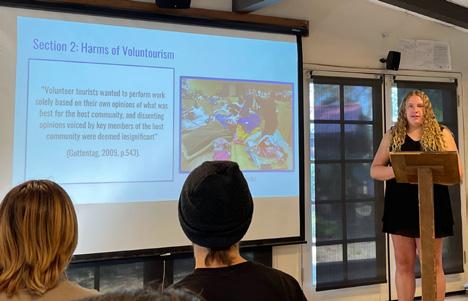
1 minute read
A Culmination of Learning
As a graduation requirement, every senior at Midland creates an original thesis or project. The task allows students to delve deeper into an area of personal interest. Students can focus on an academic, written thesis or a hands-on project. This past year, students presented on a variety of topics including wilderness therapy, the effectiveness of electric vehicles, sustainable urban mycoculture, and the psychology of extreme athletes. Several students chose topics focused on equity and inclusion such as healthcare inequities, the gender gap in basketball, and the effects of voluntourism. Projects ranged from music production to ceramic glaze-making to natural horsemanship training.
Senior Thesis is advised by Steven Hu, Humanities Faculty. In Steven’s words, “Senior Thesis represents the culmination of skills students have cultivated and developed during their time at Midland. Students do not simply write a report, rather, they engage in research that involves a continuous process of discovery, analysis, and creation. During this process, students formulate a set of research questions regarding a specific topic of their choice. They gather, critically analyze, and synthesize information from academic journals, books, and other readily available sources. Students then produce a paper that articulates the argument, methodology, and analysis of their topic. As such, Senior Thesis showcases students’ intellectual curiosity and their passions through research, critical analysis, and the communication of their topics.”
Advertisement
Senior Project is managed by Genevieve Herrick ’97, Humanities & Spanish Faculty, alongside individually matched faculty mentors. Genevieve describes the project as “an opportunity for seniors to design an independent, project-based course addressing an in-depth learning goal in an area of their own interest. It is a semester-long endeavor that requires planning, time management, research, craftsmanship, problem solving, and student agency.” Students start by submitting a comprehensive project proposal outlining their goals, and later in the process they design an individualized assessment rubric to gauge the quality and completeness of the learning goals and outcomes identified in the proposal and approval process.
As the years go on, we eagerly anticipate what students will choose to research and create.





